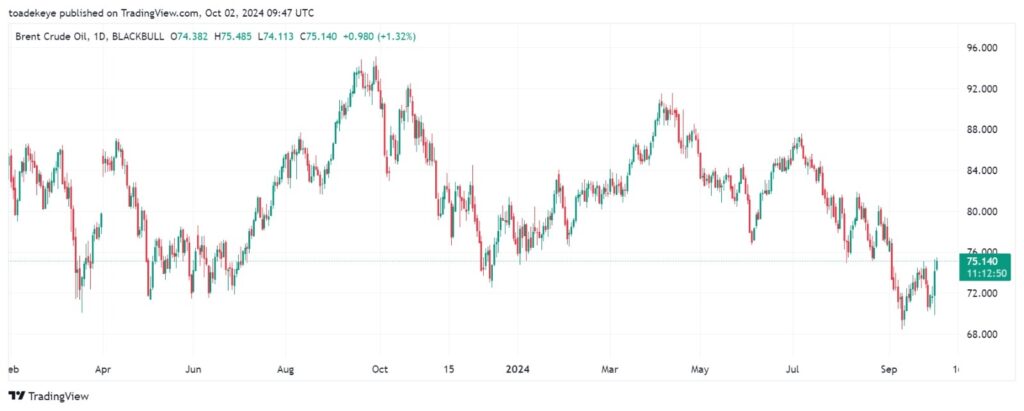
Victoria Tsado
Research Analyst
Oil prices surged on October 3, with Brent crude rising 5.03% to $77.62 per barrel and U.S. WTI crude increasing 5.15% to $73.71, amid fears that a regional conflict in the Middle East could disrupt global oil supply. Both benchmarks hit one-month highs, with Brent peaking at $77.89 and WTI at $73.97. Concerns grew over the possibility of Israel targeting Iranian oil infrastructure, prompting U.S. President Biden to acknowledge ongoing discussions on the matter. Iran, a major oil producer, contributes 3.2 million barrels per day, or 3% of global output. Analysts warn this situation could significantly impact the oil market.
U.S. Offers $1.05bn Loan To EVgo For Expanding EV Charging NetworkThe U.S. Department of Energy’s Loan Programs Office has approved a conditional loan guarantee of up to $1.05 billion for EVgo to expand its electric vehicle (EV) charging network. This will fund the construction of approximately 7,500 fast-charging stalls across 1,100 stations, with a focus on disadvantaged urban areas. Over 40% of the new chargers will be in underserved communities, helping provide EV access to individuals without private charging options. EVgo, which currently operates over 3,500 chargers, aims to improve customer service and lower costs to compete with larger networks like Tesla’s. CEO Badar Khan highlighted the company’s mission to deliver clean transportation solutions to those in need.
How Egypt Plans To Cut Wheat Imports, Subsidy Costs
Egypt plans to reduce wheat imports and cut spending on subsidized bread by adding corn or sorghum to the mix, potentially saving millions of dollars. The proposed plan, starting in April 2025, involves blending corn flour with wheat flour at a 1:4 ratio, saving around one million metric tons of wheat. However, bakers and millers oppose the plan, citing concerns about financial losses and bread quality. Egypt faces rising debt, currency shortages, and inflation, with the government viewing the bread subsidy program as a major budgetary strain.
U.S. Services Sector Activity Hits 1.5-Year High, Signals Strong Economic Growth
U.S. services sector activity surged to a 1.5-year high in September, with the nonmanufacturing purchasing managers’ index (PMI) rising to 54.9, up from 51.5 in August, according to the Institute for Supply Management (ISM). This indicates strong growth in new orders and suggests the economy remained solid in the third quarter. A PMI reading above 50 signals expansion in the services sector, which accounts for over two-thirds of the U.S. economy. Economists had expected a smaller increase, forecasting a PMI of 51.7.
NGX Banking Index Rebounds, Records 20% Recovery Amid Recapitalization Hiccups
The Nigerian Banking Index (NGX BANK) rebounded by over 20% in August and September 2024, after falling from 1,029.68 on March 28 to a low of 774.35 on April 30, following the Central Bank of Nigeria’s recapitalization policy announcement. Key banks in the FUGAZ group experienced stock declines in April, with First Bank dropping from ₦35 to ₦23, UBA from ₦28 to ₦23, GTCO from ₦52 to ₦32, Access Holdings from ₦24 to ₦16, and Zenith Bank from ₦32.50 to ₦30.90. By September, these stocks gained between 17% and 40%, and the NGX Banking Index rose to 944.48, indicating a strong recovery. However, uncertainty remains about the sector’s full recovery from the recapitalization policy.
Naira Slides 8.25% To ₦1,669.15 As Market Turnover Drops, External Reserves Rise
On October 2, 2024, the naira depreciated by 8.25%, closing at ₦1,669.15 per US dollar, down from ₦1,541 at the end of September. Market turnover decreased by 2% to $176.45 million. In the parallel market, the naira closed at ₦1,670.74. Year-to-date, the naira has depreciated by 75%, mainly due to inflation and high demand for foreign currency. Nigeria’s external reserves rose from $36.305 billion in August to $36.730 billion by mid-September. OPEC dismissed reports of falling oil prices, and the government introduced tax reliefs for offshore oil and gas projects to attract investment.











